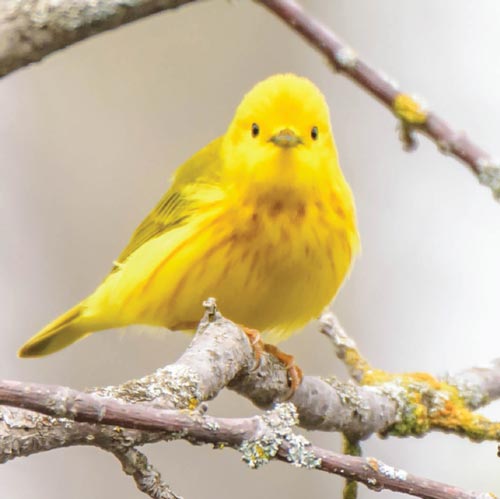
In the stillness of a pre-dawn summer morning, many distinct, often mysterious sounds find their way through the darkness. Among these sounds are the subtle calls and notes from birds. Some are quickly recognized by experienced birders – such as chatter of the marsh wrens ricocheting from a nearby cattail marsh, or the weird squelching noise of the American bittern – as these are typically nocturnal birds. But why are diurnal birds such as robins, sparrows, towhees, and flycatchers, singing in the darkness when they should be sleeping?
The male birds sing to call attention to themselves, and the messages vary depending on their purpose. They’ll sing to establish and defend a territory from other males of the same species, and their voices must be heard around the clock. Their song becomes a clear signal that a nesting and hunting ground is protected and occupied. Intruders know that if they violate boundaries, they will be attacked. So, birds tend to respect territory holders.
With careful listening, it is clear that the delivery of birdsong at night is much different from that of the daytime. These songs are not the happy, spirited songs of the sunshine, but rather, short snippets of their regular songs, barely recognizable as to species. There is a reason for this.
The lengthy calls and songs that birds normally deliver during the day become a dangerous way to communicate at night because the sounds can attract hungry predators. Brevity on the other hand creates confusion. Once uttered, these short, abbreviated calls vanish into thin air, so predators can’t use sound to locate the callers. When danger threatens, birds simply stop talking until the threat passes.
If there is a full moon, birds may sing as though it were day, because bird song is stimulated by increasing light. As dawn breaks, the sun’s rays trigger hormonal activity resulting in full song. The brighter the light becomes, the louder and more enthusiastically birds will sing. Any birds that decline to join the sunrise singing may be seen as weak or inferior by other males and females. Ecological fitness is established with song, and the legendary dawn chorus subsequently builds.
Birds also play games with intruders; they need to in order to survive. For instance, rather than choosing to sing solo on an exposed branch, where it could be easy pickings for a passing sharp-shinned hawk, a bird will take the stage with a large chorus. This makes it more difficult for a predator to single out individuals.
Birds may sing night and day to identify their real estate and to attract a mate. However, the majority of birders are convinced that birds sing for a third reason – because they are happy and are expressing themselves in song. Biologists seldom ascribe such anthropomorphic references to bird behaviour. However, many birders remain convinced that birds, like humans, are indeed capable of expressing joy in their world if things are going well for them, and there is no convincing evidence that they can’t.
Story by:
Terry Sprague
Photography by:
Wilma Michel




